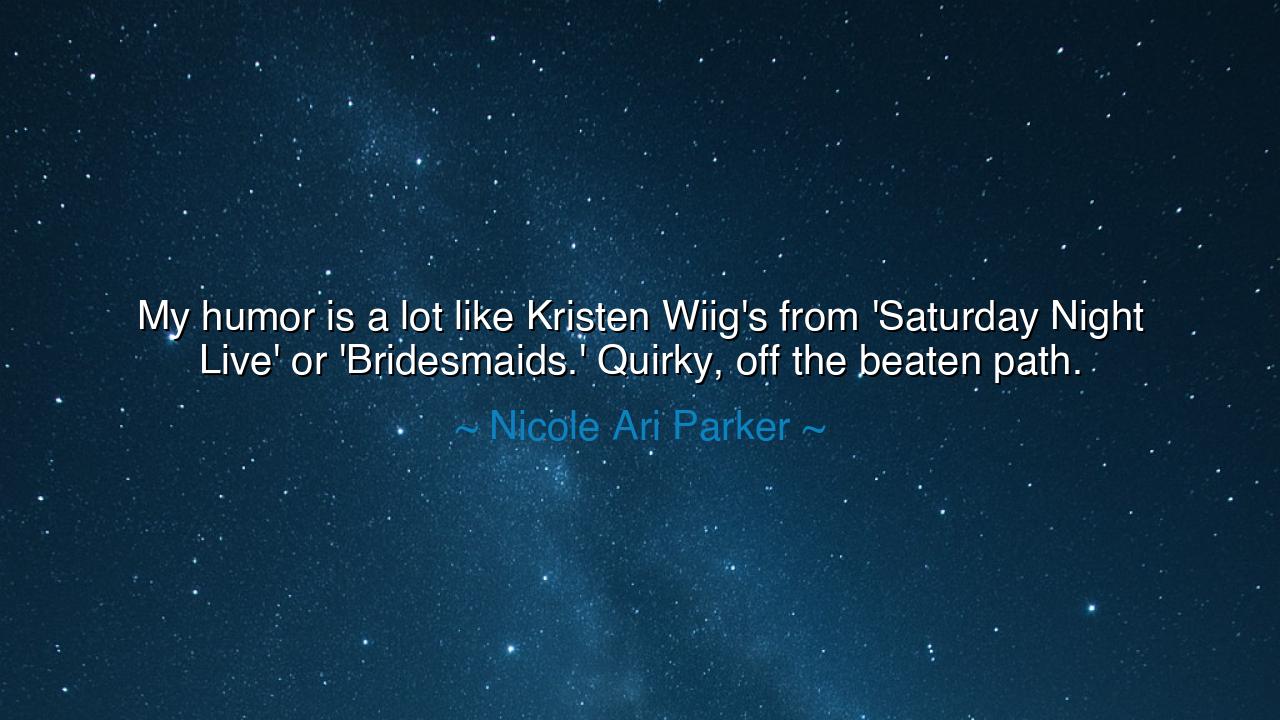
My humor is a lot like Kristen Wiig's from 'Saturday Night Live'
My humor is a lot like Kristen Wiig's from 'Saturday Night Live' or 'Bridesmaids.' Quirky, off the beaten path.






When Nicole Ari Parker said, “My humor is a lot like Kristen Wiig’s from Saturday Night Live or Bridesmaids. Quirky, off the beaten path,” she was not merely describing a style of comedy — she was revealing a philosophy of being. In her words lies the spirit of the artist who refuses to conform, who finds light in the odd corners of the human soul. Quirky humor, the kind she admires in Kristen Wiig, is more than laughter — it is rebellion through joy, the art of seeing life sideways when others see it straight. To be “off the beaten path” is to choose authenticity over approval, truth over polish, and individuality over imitation.
Humor of this kind — strange, surprising, and full of hidden tenderness — springs from the ancient wisdom that laughter is the language of the free. The Greeks spoke of Eironeia, the art of irony, through which the wise disguised truth in jest. Nicole Ari Parker’s words echo this same sacred tradition: that humor, when born of honesty and self-awareness, becomes a bridge between hearts. It reminds us that perfection is an illusion, and that joy often blooms in imperfection. To laugh at the odd, the awkward, or the unexpected is to say, “I embrace life as it is, not as I wish it to be.”
Consider Kristen Wiig, whom Parker names as her kindred spirit in laughter. Wiig’s characters — whether the nervous Target Lady, the awkward bridesmaid Annie, or the overconfident performer on SNL — embody the strange beauty of human vulnerability. They make us laugh not because they are flawless, but because they are relatable, absurd, and unapologetically themselves. In this way, Parker’s admiration reveals her own understanding of humor’s deeper power: it is not the weapon of the cruel, but the mirror of the wise. It transforms embarrassment into art, failure into connection, and isolation into belonging.
This kind of humor also has deep roots in history. In the court of Queen Elizabeth I, the court jester, Richard Tarlton, entertained nobles not by mocking others, but by embracing his own absurdity. He twisted words, performed foolish dances, and exaggerated his faults until the proud were humbled by laughter. Like Wiig and Parker, Tarlton showed that humor need not be cruel or vulgar to be powerful — it could be quirky, honest, and human. Through laughter, he spoke truths that others dared not voice, proving that sometimes the most foolish-seeming voices carry the greatest wisdom.
But there is a deeper layer to Parker’s words — a reflection of courage. To live “off the beaten path” is to live without the shelter of the familiar. It is to risk being misunderstood, to walk alone through creative wilderness. Many fear such a path, yet it is along these winding roads that originality is born. For Parker, as for Wiig, humor becomes both shield and torch — a way to face rejection with grace, to turn discomfort into self-expression. Quirkiness, then, is not oddity for its own sake; it is authenticity made visible, the soul’s laughter at its own complexity.
The ancients would have recognized this as the humor of the philosopher — one who laughs not at others, but at the absurdity of existence itself. Socrates, when mocked for his looks and questioned about his endless self-examination, laughed and said, “I am wiser than you because I know I know nothing.” His humor was humble, his irony a way of disarming pride. In the same spirit, Parker’s and Wiig’s humor teaches humility through joy — reminding us that laughter, when honest, is a form of enlightenment.
So, the lesson of Nicole Ari Parker’s quote is this: embrace your quirks, for they are the fingerprints of your soul. Let your humor reveal your truth. Do not seek to impress through perfection; instead, connect through imperfection. Laugh at yourself before the world can, and you will never lose your freedom.
For in the end, as Parker and Wiig both show us, the truest humor is not about making others laugh — it is about helping them feel seen. It is the laughter that comes from being fully, unapologetically human — the laughter that heals, that softens, and that reminds us that even the strangest paths lead home.






AAdministratorAdministrator
Welcome, honored guests. Please leave a comment, we will respond soon